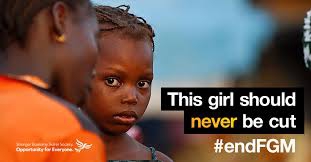Ending female circumcision in Nigeria

Worried by the increasing incidence of Female Genital Mutilation (FGM), which is also known as female circumcision in Nigeria, the United Nations Children’s Emergency Fund (UNICEF) has called for an end to the harmful and barbaric practice.
Speaking at an event to mark this year’s International Day of Zero Tolerance for FGM on February 6, UNICEF’s Communication Officer, Lagos, Mrs. Blessing Ejiofor, described the practice as the partial or total removal of the external female genitalia, or any cutting of a female’s genital organs for non-medical reasons. The menace, she said, is recognised internationally as a violation of the human rights of girls and women.
The theme for the 2017 FGM Day is “Building a solid and interactive bridge between Africa and the world to accelerate ending FGM by 2030.” According to the UN, this is in recognition of the need to advance the health and human rights of women and girls in order to meet the relevant Sustainable Development Goals.
In his own contribution at the event, the UNICEF Country Representative in Nigeria, Mr. Mohammed Fall, pointed out that every study conducted on FGM shows that there is no benefit in mutilating or cutting the private parts of any girl or woman. On the contrary, he stressed that the practice could cause severe physical and psychological harm to its victims.
Fall also emphasised that the practice violates a woman’s rights to health, security and physical integrity. It is also an infringement of women’s rights to freedom from torture and cruel, inhuman or degrading treatment, and in some cases, the right to life.
UNICEF estimates that at least 200 million women and girls are victims of FGM. The practice is primarily concentrated in 30 countries in Africa, Asia and the Middle East. However, it is a global problem. In spite of the fact that FGM has been classified as a human rights violation by the World Health Organisation (WHO), it is still being performed on thousands of women and girls every day.
Globally, it is estimated that a woman or girl is violated by FGM every ten seconds. This means that approximately 8,500 women and girls are harmed by FGM daily. According to medical experts, the procedure, which has no health benefits for women and girls, can cause severe pain, infection and prolonged bleeding. It can also cause complications during childbirth and increases the risk of newborn deaths.
The 2013 National Demographic and Health Survey showed that Osun State has the highest rate of female genital mutilation at 77 per cent. It is followed by Ogun, 74 per cent and Ebonyi, 60 per cent. Other states are Ekiti, 72 per cent, Imo, 68 per cent and Oyo, 66 per cent.
Since there is no medical justification for the practice of FGM, we call on the Federal, state and local governments to wage a relentless war against it. This war should be waged through massive enlightenment programmes that will dissuade people from this practice that is wrongly associated with cultural ideals of femininity and modesty.
Read more at http://sunnewsonline.com/ending-female-circumcision-in-nigeria/












